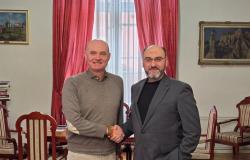Round table on the occasion of 1 March - Bosnia and Herzegovina's Independence Day

In cooperation with the Institute of History, the University of Sarajevo organized a round table on the occasion of 1 March - Independence Day of Bosnia and Herzegovina, which will be held on Thursday, 25 February 2021 at the University of Sarajevo Rectorate.
The introductory address by University of Sarajevo Rector Prof. Dr. Rifat Škrijelj, it was emphasized that 1 March 1992 is a day of pride and determination, a day when Bosnians of all nationalities decided in a referendum for a sovereign, independent, autonomous and complete Bosnia and Herzegovina, a state of equal peoples and citizens opened the event.
“This important event in the history of our homeland will be remembered as the day when Bosnia and Herzegovina, after a long time, restored its sovereignty and became an independent state. Being homeless is the same as being homeless, and this is best known to people around the world who have not exercised this right for centuries. Therefore, let us be proud of the achievements of our Bosnia and Herzegovina, whose inner strength in its thousand-year tradition has always managed to overcome all adversity. I am especially glad that today at this round table are also exhibitors who were direct participants in the events of 1992, when the future of our country was created,” said Rector Škrijelj.
The celebration of 1 March - the Independence Day of Bosnia and Herzegovina is an opportunity to discuss the political, historical, legal and sociological aspects of the events that shaped Bosnia and Herzegovina as an independent and sovereign state with international recognition. This was pointed out today at a round table whose participants elaborated on various aspects and the significance of the referendum held on 29 February and 1 March, 1992, in which BiH citizens opted for an independent, autonomous and complete BiH, a state of equal citizens and peoples, as well as other repercussions of this historical event.
The round table moderator was Dr. Sedad Bešlija, Institute of History director. At the round table spoke: academician Mirko Pejanović (Academy of Sciences and Arts of BiH) on the topic “Socio-political relevance of the celebration of Independence Day,” while Prof. Dr. Zijad Šehić (Faculty of Philosophy) spoke about the significance of the Independence Day of Bosnia and Herzegovina. Dr. Amir Kliko (Institute for Research of Crimes against Humanity and International Law) had a presentation “From the Karađorđevo Agreement to the International Recognition of Bosnia and Herzegovina,” M.Sc. Edin Omerčić (Institute of History) presented on the topic “A thorny road with a non-standard track. Bosnia and Herzegovina in the Yugoslav Crisis - A Historical Chronicle,” and Jasmin Medić, MA (Institute of History) spoke on the topic “Political and National Polarization in Bosnia and Herzegovina: Regionalization Projects.”
In the context of the socio-political and historical topicality of the BH Independence Day, academician Mirko Pejanović reminded of the importance of the referendum of citizens from 1992 for the further development of the statehood of BiH. He pointed to key events that contributed to building the capacity of BiH as a state, before and after the dissolution of the former SFRY, and the challenges facing the new government after the first multi-party elections in 1990, including obstructions by the then SDS under Karadžić. Academician Pejanović especially emphasized the importance of passing the Decision on holding a referendum of citizens in order to declare the sovereign and independent status of the state of BiH, which resulted in the acquisition of international subjectivity of BiH and its recognition by the European Union, the United States and other countries’ admission to UN membership on 22 May 1992. He assessed that the high turnout and positive voting of BiH citizens on the referendum question testify to their awareness of their country's statehood, as well as the united will for their country to gain full statehood status, and to follow the tradition of anti-fascism within which BiH emerged as a federal state unit.
The importance of the Independence Day of BiH and the need to nurture the state-building consciousness of its citizens was also pointed out by a professor at the UNSA Faculty of Philosophy, Dr. Zijad Šehić, as well as the director of the Institute of History Dr. Sedad Bešlija, who pointed out that the past of the society is becoming part of the culture, and that BiH still has a lot to realize, respecting modern trends and leading an argumentative dialogue, without the addition of revisionism and attempts to deny historical facts. They also underlined the role of the international community in preserving and further developing BiH as a functional and European-based state, including raising issues such as overcoming Dayton constraints and the need for constitutional reform, and issues of state structure and organization, economic relations, cooperation with neighbors and responses to still present great-power aspirations.










